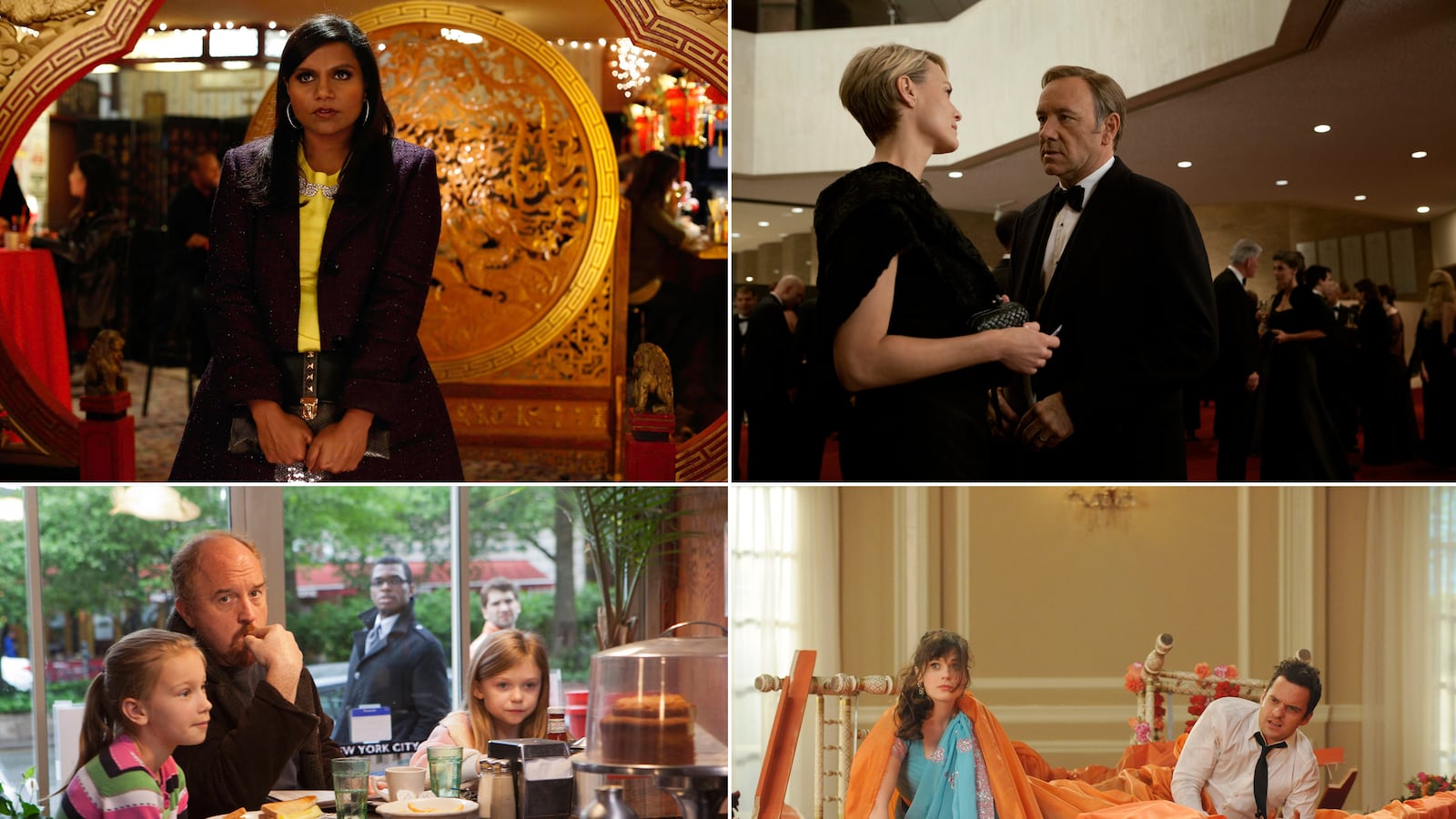On Thursday, the Television Academy announced its nominations for the 65th Primetime Emmy Awards, and Netflix crashed the party in a big way with its two high-profile shows, House of Cards (which racked up nine nominations) and Arrested Development (which had three).

But those newbie nominations were largely the exception, as an extraordinary crop of new series and performances—Orphan Black, Hannibal, and The Americans among them—failed to gain traction with Emmy voters, many of whom reflexively gravitate to the same shows and actors each year.
In many cases, though, those repeat nominees are well-deserved: Emmy mainstays Mad Men, Breaking Bad, and 30 Rock are back this year, celebrating their respective superb seasons with another abundance of nominations. But let’s skip the stalwarts and focus on the rest of this year’s Emmy crop: the good, the sad, and the ugly.
THE GOOD
House of Cards
Netflix went all-in with their first splashy original series: a dream team of Kevin Spacey, Robin Wright, and director David Fincher, that voters were unable to resist. This slick, captivating drama about a scheming house majority whip (Spacey) plotting political revenge after getting passed over for a Secretary of State appointment garnered nominations for Spacey, Wright, and Fincher. The only snub here (and a possible indication that voters might not have gotten beyond House’s first few episodes) is Corey Stoll, whose heartbreaking turn as U.S. Rep. Peter Russo, who desperately wants to make a difference but can’t escape his addiction demons, was overlooked in the supporting drama category.
Vera Farmiga, Bates Motel
Bates Motel, A&E’s modern-day Psycho prequel examining Norma and Norman Bates, is still figuring out exactly what it is. But Farmiga, as Norma, had no such indecision, confidently throwing herself into the complex role from the start. In lesser hands, Norma could have easily been a loony caricature, but Farmiga turned her into a multi-layered masterpiece.
Political Animals
I was a big fan of USA’s “limited series” from last summer about a former First Lady (Sigourney Weaver), divorced from a charismatic President, who after a failed run for President, ends up as Secretary of State. Yes, it sounds like a certain politician that you know, but Weaver’s enthralling Elaine Barrish was no mere Hilary clone. I thought USA made a mistake in not continuing with the show and in the process earning an annual seat at the Emmy table, and Animals’ five nominations (including miniseries or movie and lead actress) bear that out.
Laura Dern, Enlightened
Enlightened, HBO’s gem of a show about an idealistic but abrasive woman (Laura Dern) trying to change, and eventually expose, the corruption at her company, was only watched by a handful of people. Thankfully, some of them were Emmy voters, who nominated Dern. It was hard to root for Dern’s Amy Jellicoe, who in the first season couldn’t get out of her own way. But in Season 2, Dern somehow converted us, slowly but surely, over to Amy’s side, so her Norma Rae moment in the finale was a true triumph, and a fitting farewell to that character.
Top of the Lake
Last year’s miniseries or movie competition was rail-thin (the winner, Game Change, was praised more for Julianne Moore’s perfect Sarah Palin than its overall quality), but the category got a major upgrade in 2013 with this superb Sundance/BBC Two miniseries. Directed by Jane Campion, about a detective (Elisabeth Moss) searching for a missing girl in New Zealand, was one of TV’s greatest finds. It was a banner year for Moss, whose gripping performance also received an acting nomination to go along with her usual nod for Mad Men.

Louis CK, Louie
Yes, he’s a repeat Emmy nominee and winner, but this year, the comedian grabbed an astounding nine nominations overall, for his various acting, directing and writing work on Louie, his HBO comedy special and hosting Saturday Night Live (if he did makeup on Louie, he’d probably pick one up for that too). Best of all, Louie—which had six nods overall—finally broke into the Outstanding Comedy category, where it deserves to win as the most inventive, surprising half-hour on TV.
Mandy Patinkin, Homeland
I made the case for the Homeland star’s inclusion, so it is a relief to see him land the supporting actor nomination he so deserved. (His was one of 11 nominations for Homeland, which also nabbed a supporting actress nod for Morena Baccarin.) While Patinkin’s supporting actor inclusion seemed a lock, it was a nice surprise to see him joined in the category by Breaking Bad’s Jonathan Banks, who shone as world-weary enforcer Mike.
Kerry Washington, Scandal
There’s nothing guilty about this pleasure: Scandal, ABC’s series about a crisis management team in D.C., was the year’s most addictive drama. And that’s largely due to Kerry Washington’s Olivia Pope, who is unlike any other character on TV: she’s whip-smart, confident, brash, and emotionally wounded, usually all in the space of about 90 seconds. The show deserved even more Emmy recognition, but Washington is a good start.
***
THE SAD
Tatiana Maslany, Orphan Black
After two seasons on Homeland, I was convinced that no one could touch Claire Danes in the drama lead actress category. Then I fell hard for the star of the BBC American science fiction drama Orphan Black about a grifter who discovers that she is one of (at least) 10 clones. It’s a near-impossible task, but Maslany, a Canadian actress with no major U.S. credits, has created seven wholly distinct characters, not just minor variations on the same person. Her transformation is so astounding that often you’ll forget that she’s carrying whole scenes talking to…herself (think back to Ringer, where Sarah Michelle Gellar played twins and could barely differentiate between them). BBC America tried hard for a nomination, but voters simply weren’t able to watch in time. Once they discover what they’ve been missing, they’ll regret leaving Maslany off their ballot.

New Girl
Remember when this show was “adorkable”? Neither do I. After retooling on the fly in Season 1, the FOX comedy took a gargantuan quality leap forward in its sophomore year, smartly allowing Zooey Deschanel to rein in her quirks while encouraging her three roommates to embrace theirs. And while Max Greenfield’s Schmidt was a late Season 1 breakout, this year allowed Jake Johnson’s Nick to move center stage and act on his romantic feelings for Jess (Deschanel), in the process, helping New Girl mature into one of television’s finest comedies. Yet the show, which received five nominations in 2012, was completely shut out this year. To recap: The Neighbors has more 2013 Emmy nominations than New Girl.
The Americans
The best new show of the year, which ended as spectacularly as it began, was unable to crack a well-established drama field. Keri Russell was a revelation as Elizabeth Jennings, a KGB agent stuck in America and yearning for a life and a family in Mother Russia, slipping into new identities and aliases with the same ease she put on her Guess jeans. Her other half, Matthew Rhys, had an even tougher task as Philip: Rhys is a Brit playing a Russian spy masquerading as an American, who frequently switches to other roles as well. But voters overlooked them, the show, and Noah Emmerich’s understated FBI agent Stan Beeman. One consolation: a guest actress nomination for Margo Martindale’s fierce turn as Claudia, Elizabeth and Philip’s CIA handler.
Rectify
This quiet, contemplative Sundance Channel drama about a death row inmate (Aden Young), who after 19 years on death row for the rape and murder of his teenage girlfriend, is freed after DNA evidence comes to light. The leisurely pace wasn’t for everyone—especially voters, apparently—but I loved losing myself in its story.

Mindy Kaling, The Mindy Project
The Mindy Project pilot is vastly different from what the FOX comedy had become by the end of its first season (I lost track of all the times it retooled and cycled through new cast additions), but through all the turmoil, Kaling deftly anchored the show and always kept me laughing. I would have liked to see her recognized for that, but now that Mindy Project has finally found its groove, there’s always next year. (Or maybe not, if New Girl is any indication.)
Justified
I’ve long given up expecting Emmy voters to wholly embrace this splendid FX drama, which more than any other, has a language and sense of place all its own. But they consistently would throw a couple acting nominations the show’s way each year (and in 2011, they even gave Margo Martindale the win for her unforgettably sinister turn as Mags Bennett). But this year, the show was shut out completely, even in the guest actor category, which could have been comprised solely of splendid Justified actors like Jere Burns and Patton Oswalt’s Constable Bob.
***
THE UGLY

The Good Wife
The broadcast networks’ last great hope for Emmy drama recognition fell even further out of favor with voters, as it was unable to claw its way back into the Outstanding Drama category, where it was shut out last year as well. Adding insult to injury, Juilanna Margulies, who won Lead Actress just two years ago, wasn’t nominated either. Though the drama stumbled out of the gate in its fourth season with an icky, 50 Shades of Gray storyline involving the enigmatic Kalinda (Archie Panjabi), her sleazy, abusive ex-husband Nick (Marc Warren), and (shudder) an ice cream cone, showrunners Robert and Michelle King wisely course-corrected and didn’t make a misstep the rest of the season. At least the show had its usual strong showing in the guest star categories, where I’m most thrilled about the long-overdue recognition for Carrie Preston, who is so brilliant as daffy attorney Elsbeth that I keep hoping True Blood will put Arlene out of her misery, freeing Preston up to delight us full-time on Good Wife.
Matt LeBlanc, Episodes
I like LeBlanc and think he’s the best thing by far on the meandering Episodes, which means well but hasn’t yet gelled during its two seasons on Showtime. But giving him a second Emmy nomination as Lead Actor, Comedy over a slew of deserving candidates (including New Girl’s Johnson) is mind-boggling.
Hannibal
I did not have high hopes for Bryan Fuller’s take on Thomas Harris’ novel Red Dragon (which introducing the characters the world would come to know in Silence of the Lambs), and couldn’t have been more thrilled to be proven wrong. The Hannibal Lecter saga had largely been driven into the ground by the post-Silence offerings, but Hannibal reset the table with one delicious course, I mean episode, after another. For a broadcast show this visually audacious and daring to be shut out completely—not even a cinematography nomination!—is inexcusable, and an oversight that needs to be corrected next year.






